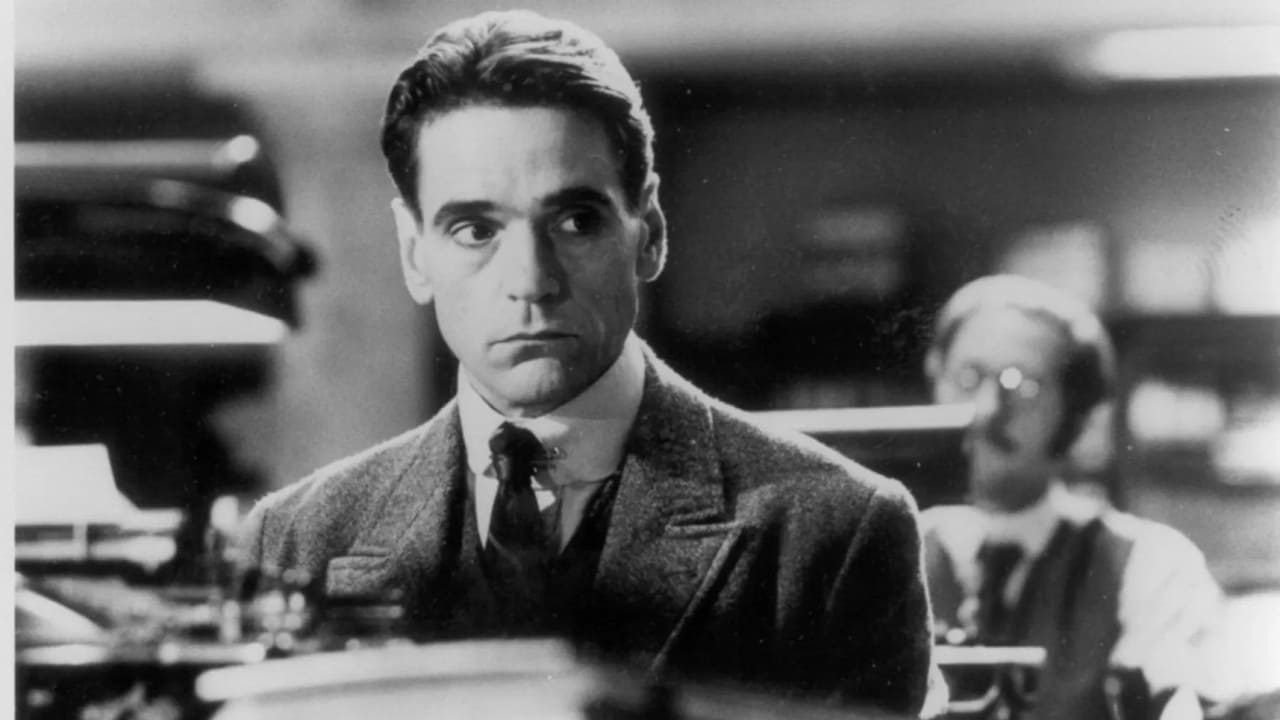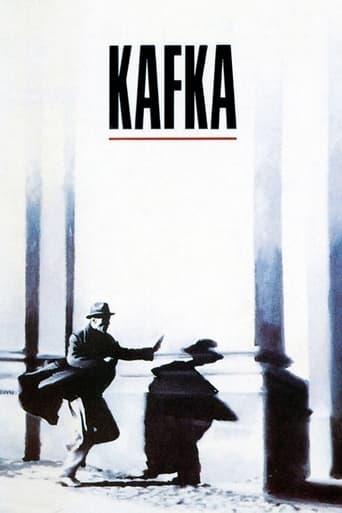

Highly Overrated But Still Good
... View MoreDisturbing yet enthralling
... View Moreif their story seems completely bonkers, almost like a feverish work of fiction, you ain't heard nothing yet.
... View MoreIt is neither dumb nor smart enough to be fun, and spends way too much time with its boring human characters.
... View MoreSteven Soderbergh's cult "Kafka" is not a biopic of writer Franz Kafka, yet it has references of his works such as "The Castle", passages of his life (where he tells to a friends to burn his manuscripts away without showing his writings to the public) and a main character who happens to be a writer named Kafka. The extremely shy Kafka (Jeremy Irons) works in a bureaucratic place where he also writes to himself a few stories and some letters to his father. In this same place he only has one friend, a guy named Edward Raban who disappeared mysteriously. Kafka starts a strange journey trying to figure out what happened to his friend entering in a dangerous game with some strange figures such as Edward's lover and Kafka's co-worker (Theresa Russell) and her revolutionary friends; a very friendly figure who knows too much (Jeroen Krabbé); Grubach a police inspector (Armin Mueller-Stahl); and some of his own work colleagues such as his new assistants (Keith Allen and Simon McBurney), his estranged boss (Alec Guinness) and the annoying Mr. Burgel (Joel Grey); and at last Dr. Murnau (Ian Holm).In a magnificent performance Jeremy Irons makes of his Kafka a man suffocated by the environment where he lives and the only way to escape of it it's to write stories that reflect his life in an awkward way and/or his life as an "investigator" that took him to darker places that could have been a source of inspiration for his works. The movie goes to tell us that he lived in a bizarre and very surrealistic place with surrealistic figures all around him and they were always trying to watch his next step, what he was doing and Kafka run away from this people, hides his writing works. This is a good thriller material!Soderbergh makes of "Kafka" a good humored film noir that has a great mystery to be solved, the rhythm of the film is intertwined with some slow paced moments where you can pause your brain to solve some of the puzzles, a frantic suspense that goes to complete a surrealistic plot. The final result is a great movie with nothing obvious and it makes good homages to Kafka's work, and homages to another classic films. It is an interesting cross between "The Third Man" and "Brazil", the visual of those two films combined along with the almost colorless Kafka's books are put together in here. Walt Lloyd's cinematography is one of the most interesting and effective work ever made in film history, a photography that goes from black and white to color in a great way, showing these two worlds that seem to distant so each other when in fact they're close enough. In this case you can sense that the colorful world presented in the castle isn't better than the oppressive grey world outside of its dominions, the colors are presented only to tell us a frightening reality that is so shocking that we really want to go back to the black and white world along with Kafka. And as a great mind said one time: "The black and white doesn't lie". Unnoticed in its time "Kafka" is a cult film that must be revered by everyone and must of all revered by Kafka's fans even though this is not a biographical movie, it's more like a film that reveals more of his persona and an invitation to visually penetrate to his own creations. Or don't you think that we don't live in a Kafkanian nightmare in a Kafkanian world? 10/10
... View MoreWell, I viewed this Soderbergh vignette of the motifs, and fictionalization of some of the facts in the life of K. I must say that although I preferred Daniel Day-Lewis's T.V. rendition in the Insurance Man {1986}, I am a big fan of Jeremy Irons {loved his Cronenberg Dead Ringers "tour de force"} and always find his image arresting. I have a slight reservation about his look in this movie. What was particularly impressive acting-wise was the interaction between Sir Alec Guinness and Irons and later in the climax when the great Ian Holms and Irons battle it out for the heart and mind of Humanity - when Kafka declares "I merely write about Nightmares but you create them" I thought that the whole scenario when Kafka enters the Castle and encounters the labyrinthine corridors, the endless doors, the multitude of bureaucrats, culminating in a finely rendered Hitchcockian chase involving shadows, clocks and a precarious {edge-of-seat} balancing act on a glass-dome - powerful movie muti. I could see the movie clearly in my head over 24 hours later. You need not know anything about Kafka in order to enjoy this movie about an alienated young man who has taken an unambitious clerkship as a result of qualifying as a lawyer and now imagines himself a writer to escape the dreariness of his tasks. His hunger for the catharsis of worldly pleasures leads him to bohemian outlets which in turn leads to more radical connections { where he delivers his quintessential challenge to the writing profession "I don't write for others, I write for myself"}. The "femme fatale" is interestingly portrayed by Theresa Russell, who manages to combine the intellectual virago with a sensual ooze which contrasts well with Kafka's distracted isolation - I found it quite plausible that these two had an attraction for each other. This film offers a variety of content and substance. All that can happen if you give it a viewing is that you might learn more about the "Human Condition" Can that be such a bad thing?
... View More(There are Spoilers) Dark and depressing movie about man's fight to keep his individualism in a world run and controlled by faceless and unfeeling bureaucracies. Franz Kafka, Jeremy Irons, has been quietly working as a clerk for a major government insurance company for almost nine years with the only person that he ever had a social relationship with being fellow clerk Edward Raban,Vladimir Gut. Edward had been secretly an active member of a revolutionary group that the secret police have been tracking and ends up dead floating in the Danube River.Kafka informed that Edward committed suicide by police official Gruback, Armin Mueller-Stahl, takes it upon himself to find out what really happened to his friend. Kafka gets in touch with Edward's girlfriend and fellow insurance clerk Gabriela, Theresa Russell, that has him ending up joining the anti-government group that the late Edward Raban and Gabriela are members of. Being a strong proponent of individualism himself Kafka fits right in with Gabriela and her fellow revolutionaries and become involved in overthrowing the government that he works for. A government that has enslaved him and his fellow workers by taking away their right to think for themselves. Where they eventually end up as a mindless mass of brainwashed zombies loyally obedient to every command, as senseless and ridicules as it is, that those in power give them.Kafka getting a promotion by his boss the chief clerk, Alac Guinness, that was supposed to go to his dead friend Edward. What he doesn't know is that he's being spied on by the two bumbling assistants that he's been assigned and that the government has already put him on their sh*t-list as a person who's ideas are dangerous to the state.It's later when Gabriela is fired from her job that Kafka realizes that the government, through it's secret police, is on to both him and the revolutionary group that he and Gabriela are members of. Thats when trying to track her down he finds this secret morgue that the government uses to store the hundreds of bodies of undesirables that it secretly murdered. Giving them false death certificates claiming that their deaths were due to natural causes.Determined to get to the bottom of what's going on Kafka makes his way into the Castle where all the records of everyone in the country are stored. It's there that he comes face to face with both the madman Dr. Murnau, Ian Holm,who runs the place and his biggest and most frightening nightmare.In the end Kafka goes back to his job as government clerk knowing that he as an individual can never defeat the massive and faceless bureaucracy that runs his, and the peoples, life. But through the power of the pen he can put his thoughts and ideas on paper and hopefully, when published, that will galvanize the people to rise up and tear down the bureaucracy that has taken away his, and the peoples, will as well as heart and soul.Franz Kafka would not live to see his 41th birthday dying on June 3, 1924. Unknown at the time of his death his writing have become the inspiration to many writers and philosophers over the years in informing the public about that dark cold and unfeeling world. A world that Kafka observed during his lifetime, 1883-1924, and was force to live and suffer in.
... View MoreKafka, a clerk at a Prague insurance firm, is upset when a friend mysteriously vanishes. Investigating the disappearance, he uncovers a group of terrorists trying to expose a secret police state where all non-conformists are kidnapped and murdered.This is a terrific mosaic of a picture; part biopic (Franz Kafka was a clerk, did not get on with his father, asked a friend to destroy his manuscripts and died of tuberculosis), part adaptation of Kafka's fiction (notably The Castle and The Trial), part homage to German expressionist cinema (Holm's character is called Murnau), and an enjoyably scary Gothic thriller with a great mad cast. Irons is a perfectly repressed hero, Russell is as gorgeous and intimidating as ever, Krabbe steals his scenes as a canny gravedigger, Mueller-Stahl is a copper from forties film-noir complete with razor-blade voice, Glover is an iconic villain and Allen and McBurney have a whale of a time as two pratfalling assistants. The script is a bit disposable, but it captures the essence of Kafka's nightmarish scribblings perfectly - hideous bureaucracy, impotent heroes, monstrous cabals, devious conspiracies and an overwhelming sense that truth and beauty are beyond our grasp. Shot in Prague in glorious black-and-white on fantastic period locations and stunning sets by production designer Gavin Bocquet. This is a great filmmaker's film - it's impossible to imagine it existing in any other form of expression, and it manages to be richly artistic but at the same time extremely enjoyable and completely lacking in pretension. Soderbergh is a bit of an enigma to me - this is a great movie, as is his subsequent film, King Of The Hill, but both bombed financially, whereas many of his later more commercial and critically-lauded movies are much less interesting. Check out Kafka though - it's got style, scares and terrific performances, and it's about the greatest paranoid fantastist that ever lived.
... View More